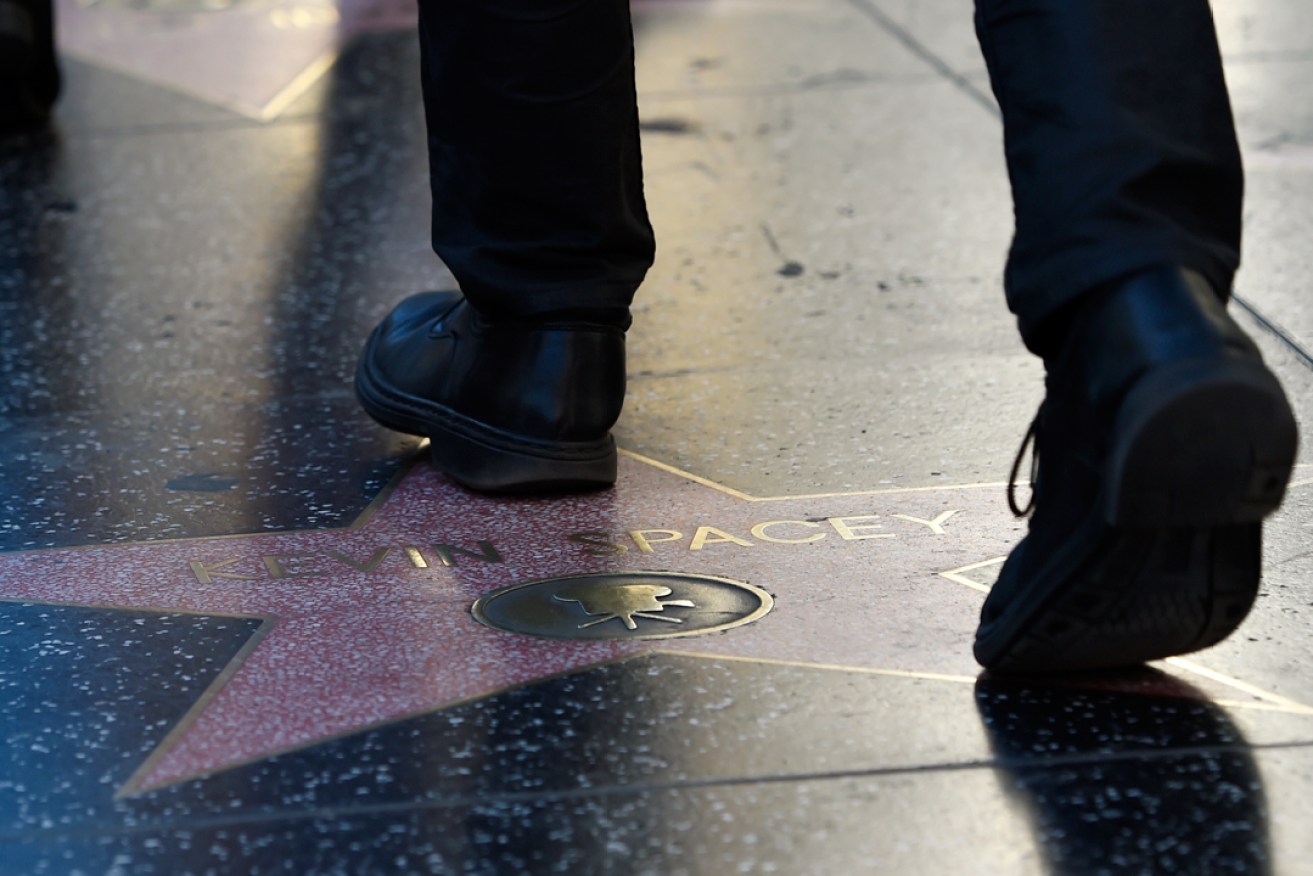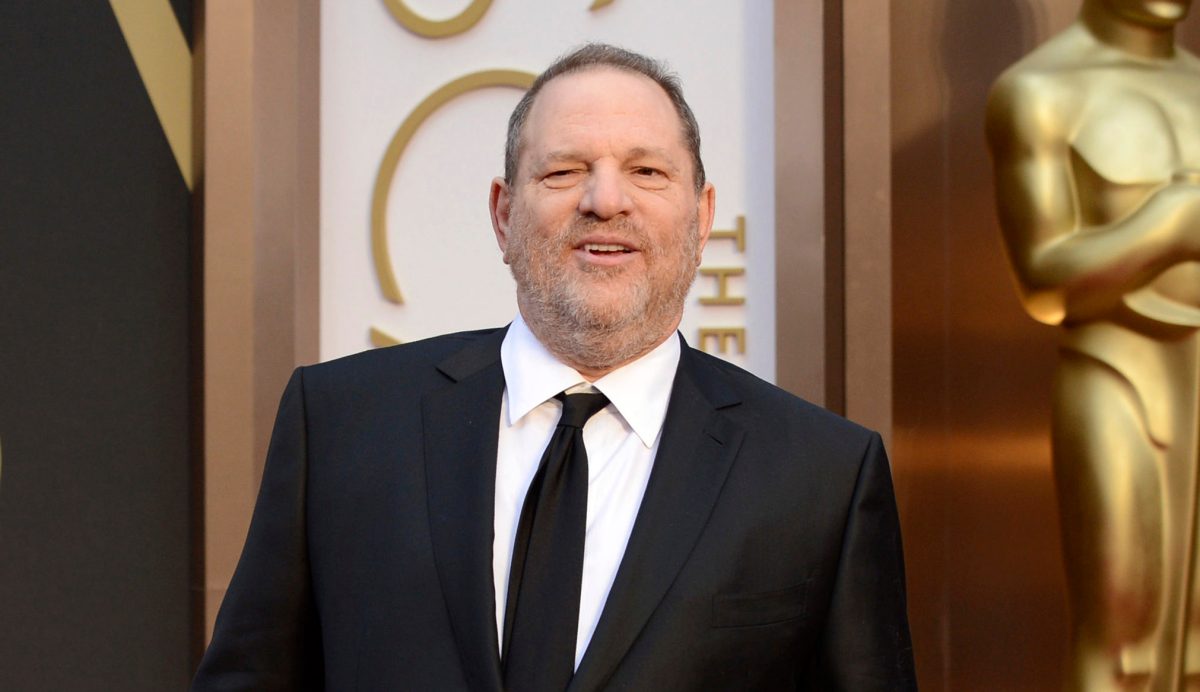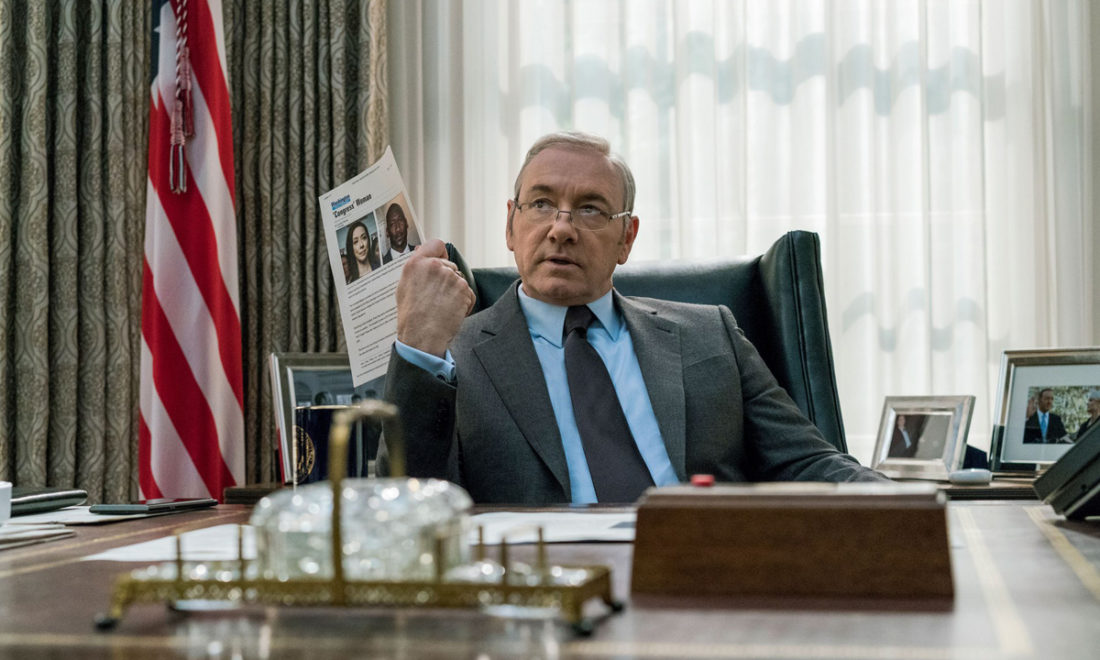Bad men: Hollywood’s annus horribilis
Madmen’s Don Draper may have walked the line between being a sexy, flawed victim of his own past and a womanising misogynist, but many Hollywood men have crossed that line. In 2017, Tinseltown’s most meaningful release has been of the details of its own disturbing melodrama, writes Adelaide film critic Nick Prescott.


Walk of shame: Disgraced actor Kevin Spacey's star on the Hollywood Walk of Fame. Photo: AP
For the record, the starting point for this piece was the notion of writing a “Best of 2017” list, celebrating some of the artful, life-affirming, beautifully made films that have been released this year (Lucky, Moonlight, the extraordinary Lion); the intelligent, visionary blockbusters (Dunkirk, Blade Runner 2049), the quiet surprises (Sofia Coppola’s The Beguiled) and so on.
It quickly became clear, however, that the enormous and forbidding elephant standing in my study – and my study isn’t terribly large – represents the ongoing saga of sexual harassment, assault, manipulation and exploitation that has marked this Hollywood year; a saga replete with outright monsters, arrogant, unrepentant villains, surprising confessions and apologies, tragic stories of careers ruined because would-be victims wouldn’t play along, all supported by a cast of various liars, exaggerators, and those willing to over-react to heartfelt and intelligent commentary.
It’s a situation that is very complex to describe, uncomfortable to comment upon, and horrifying to witness. I don’t think I’d feel that I had done my duty as a film critic without having confronted it.
What sense are we to make of Hollywood in 2017? Will it be, as some (including the widely misunderstood and extremely articulate Matt Damon) have suggested, a “watershed moment”, after which certain behaviours will no longer be tolerated?
I’m not prepared to say, but I certainly hope it will be.
I can well remember being deeply shocked when, in 1998, Robert De Niro’s name appeared on a list of clients who had engaged with a group of French “procurors” who allegedly enticed would-be actresses – many of them underage – into a prostitution ring that serviced extremely wealthy clients. While De Niro was swiftly questioned and released without charge, the story served as yet another peek behind the curtains into the dark side of Hollywood that had always been there, that had always protected its own Bad Men, from Errol Flynn and his yachting pals onwards.
De Niro finished the film he was working on and vowed never to visit France again. The case was closed; De Niro’s celebrated career continues to this day.
The great male stars of Hollywood – like rock stars and racing-car drivers and sporting champions – have always been elevated to the kind of God-like status that attracts groupies like it does Bollinger and limousines. In the 1970s, the likes of Dennis Hopper, Jack Nicholson and Warren Beatty were consistently (and, it would seem, accurately) labelled “serial womanisers”, “bad boys”, “pussy-hounds” and the like – and, whatever scandalous behaviour they may or may not have engaged in during their heyday, their careers continued apace.
The Polanski statutory rape case of 1977 – with which Nicholson was very peripherally connected – served as something of a wake-up call to Hollywood at the time; though the sad complexities of the case seemed to render it more a singular and terrible story than an indicator of any pervasive activity among the Hollywood élite.
To suggest that those post-Manson-murders, those “Polanski rape case” years seem more simple and transparent in retrospect seems terrifying, and utterly bizarre. Yet this year, Hollywood’s annus horribilis has shown in horrifying detail the ways in which permissiveness, privilege, and the tendency toward corruption in closed, money-soaked systems can give birth to a fully-functional underbelly of patriarchal monstrousness.
We have been bombarded with evidence of sexual manipulation, career-ruining misogyny, and unforgivable sexual exploitation that has, up until now, been protected by the glitzy armaments of Hollywood’s own multi-billion-dollar culture of privilege.

Producer Harvey Weinstein. Photo: Jordan Strauss/Invision/AP
With the Harvey Weinstein revelations – and indeed it is difficult to read the list of horrors this man has perpetrated upon a staggeringly extensive list of female actors – the cork finally popped out of this huge, rancid bottle of ill-gotten champagne, and has seen many incredibly brave victims put up their hands and say: “This system, and these men, exploited, assaulted and degraded me”, while other equally brave victims have said, “Yes, this happened to me, too”.
Interestingly, and perhaps thankfully, cases like that of the Louis CK accusations and admissions have simultaneously demonstrated that some men are willing to acknowledge the inappropriate nature of particular sexual behaviours, to look their accusers in the eye, and to beg forgiveness. Modern parlance would call this “owning one’s behaviour”, and while at heart it may be meritable, the larger issue remains unchanged – many of the most powerful men in Hollywood have engaged in systematic sexual harassment, assault, and manipulation of actors and co-workers of all statures and levels of fame, and have done so remorselessly.
The number of questions raised by all of this is something we as audience members should take extremely seriously
While the Hollywood story of 2017 is absolutely one about bad men, one cannot limit the list of victims to females alone; the revelations around the predatory behaviour of Kevin Spacey all too clearly demonstrates that men can also be victims of harassment and unwanted sexual attention. Spacey’s accusers – many of whom are members of teams working on the same sets (House of Cards) and stages (the Old Vic), and who thus seem to have been domino-like, one-after-the-other victims of unwanted attention and in many cases actual assault – finally spoke out after actor Anthony Rapp made the first accusation.
Spacey’s response to that first claim, a wince-inducing story of drunken forgetfulness, was swiftly – and in my mind, unforgivably – followed by the actor’s ludicrous attempt to deflect media attention by coming out as gay. Spacey’s sexuality has been one of Hollywood’s “open secrets” for years, and to attempt to “hide behind the rainbow”, as a dear friend and colleague of mine put it, seems the lowest of low acts with which to respond to such serious accusations. The worst of it, of course, is the fact that Spacey’s ham-fisted diversionary tactic effectively equated homosexuality with sexual predation.
Fine actor that he is, Spacey’s career, for the foreseeable future, is deservedly over. (Director Ridley Scott, as many readers will know, has entirely reshot his soon-to-be released All the Money in the World in order to replace Spacey’s performance with that of old reliable Christopher Plummer.)

Netflix has decided to finish filming the final season of House of Cards without Kevin Spacey, who played US President Frank Underwood.
The number of questions raised by all of this is something we as audience members should take extremely seriously. The first one, perhaps, is one of complicity: not our own, necessarily, as people giving Hollywood money, but the notion of complicity within a system that is such a large part of our lives.
Are we right to wonder just how many people in Hollywood were involved with the paying off, shutting down, or otherwise covering up victims of sexual crime while simultaneously going about their business as members of the moviemaking fraternity? Should these people be sought out and prosecuted? Should particular studios and films be boycotted?
A second question is that old chestnut regarding whether or not we can separate the art from the artist. I have had recent conversations with colleagues who argue that, in Polanski’s case – given his evident repentance, and especially the forgiveness voiced by his victim, Samantha Geimer – it is possible to consign that tragic case to history; to engage in our own forgiveness of a great artist. I have regarded Polanski as an out-and-out genius since I first saw Chinatown, but I can’t regard him as a decent man.
Perhaps the key here is that all of this, all of this horror, has taken place under the shadow of an American President who is not only on tape bragging about his own extensive history of sexual assault, but who was elected after the tape had been aired, and who now sees fit to simply deny every one of the at least 20 cases of sexual assault of which he has been accused.
When the most powerful man in the world is by his own admission a serial assaulter of women, and when that man subsequently denies every accusation levelled against him and goes as far as to describe some of his accusers as simply too unattractive to warrant sexual assault, something is clearly very wrong with, if not the world, at least with America.
Hollywood has long functioned as a kind of voice of America for many of those who don’t live there, and maybe – just maybe – with that voice continuing to sound so unrepentant, and with an unrepentant sex offender holding the highest office in the world, the broiling anger shared by so many victims who suffered years of abuse in silence in their own industries gave them the bravery to act – to decide that it would be best for the rest of us if they spoke out.
These accusers, these victims of repugnant male behaviour, are taking the reins and behaving as heroes.
As a film critic, I have never been more proud to speak about these brave actors, male and female, to celebrate their achievements, and to add my voice to those who condemn every remorseless perpetrator, and offer long-distance support and enduring respect to those who would now hold them to account.
Dr Nick Prescott lectures in Literature, Film and Creative Arts at Flinders University. He is a film critic broadcasting weekly on ABC Adelaide 891, and is a member of the Film Critics’ Circle of Australia and FIPRESCI (the international federation of film critics).




